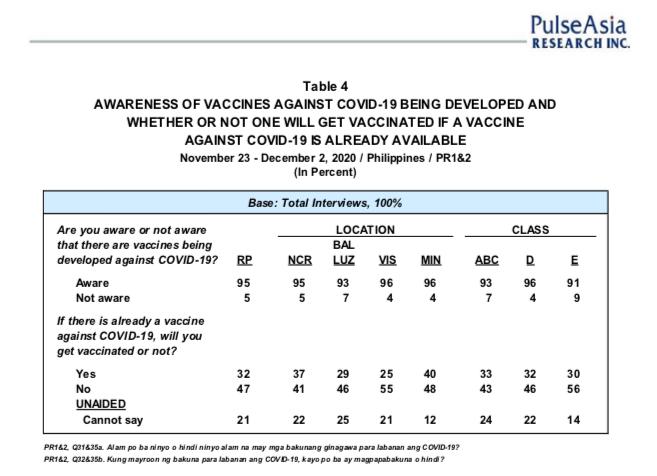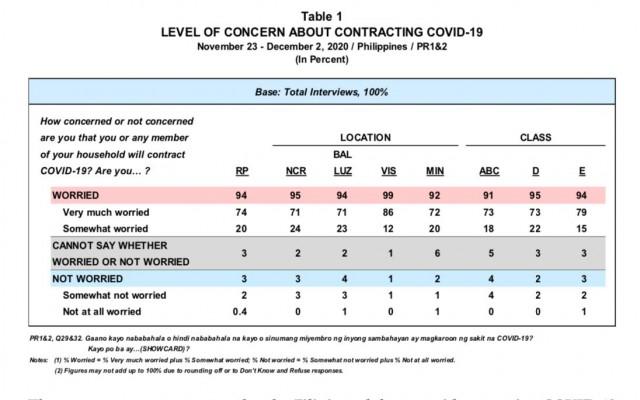Nearly 50% of Pinoys not inclined to get COVID-19 vaccine —Pulse Asia

A near majority of Filipino adults are "not inclined" to get the COVID-19 vaccine, with safety concerns being the top reason, the latest Pulse Asia survey results show.
While 95% of Filipinos said they are aware vaccines are being developed, 47% said they would not get vaccinated. Only 32% expressed willingness and the remaining 21% said they were ambivalent, according to Pulse Asia.
Eighty-four percent of those who said they would not get vaccinated cited safety concerns as the reason for their unwillingness.
A smaller percentage, 7%, worried the vaccines might not be free, another 5% believed inoculation is not required to combat the disease, and 4% said the vaccines might be expensive, Pulse Asia reported on Thursday.
In Luzon, 46% said they would not get vaccinated. Fifty-five percent of respondents in Visayas had the same sentiment, as did 46% and 56% of those surveyed from Classes D and E.
Meanwhile, 41% of Metro Manila residents said they would not get vaccinated, as did 48% in Mindanao, and 43% in Classes ABC, according to Pulse Asia.
Conducted from November 23 to December 2, the survey is based on a sample of 2,400 adults. It has a ± 2% error margin at the 95% confidence level.
British pharmaceutical firm AstraZeneca and American company Pfizer have both applied for emergency use authorization (EUA) for their COVID-19 vaccines in the Philippines.
Two of China’s COVID-19 vaccine makers—Sinopharm and Sinovac—will seek emergency use approval from the FDA this week, according to Manila’s Ambassador to Beijing, Jose Santiago “Chito” Sta. Romana.
Concern about contracting COVID-19
The Pulse Asia survey also showed that 94% of Filipino adults were worried about contracting COVID-19. The figures were "essentially the same" across geographic areas and socioeconomic classes.

The larger part of those who are worried—74%—reported being "very much worried," while the remaining 20% were "somewhat worried," according to Pulse Asia.
Only 3% said they were not worried and the remaining 3% said they cannot say whether they were worried or not.
To avoid getting infected, 71% of Filipinos said they cleaned their hands regularly and 66% said they use face masks.
Pulse Asia also reported that 32% said they stay at home unless a trip outside is necessary, 30% said they observe social distancing, 20% said they use face shields and avoid crowded places.
The polling firm also recorded smaller percentages of people saying they pray (14%), avoid people who are sick (13%), take vitamins (13%), cover their nose and mouth when sneezing or coughing (9%), avoid domestic travel (7%), consult a doctor or healthcare provider when not feeling well (4%), and avoid international travel (1%).
In addition, Pulse Asia said 58% of Filipino adults lost their job or source of income and 44% said their income decreased as an effect of the pandemic.
More than half, or 51%, said they experienced emotional problems like stress or "extreme sadness," while 55% said they became closer to their family, the pollster said.—AOL, GMA News



